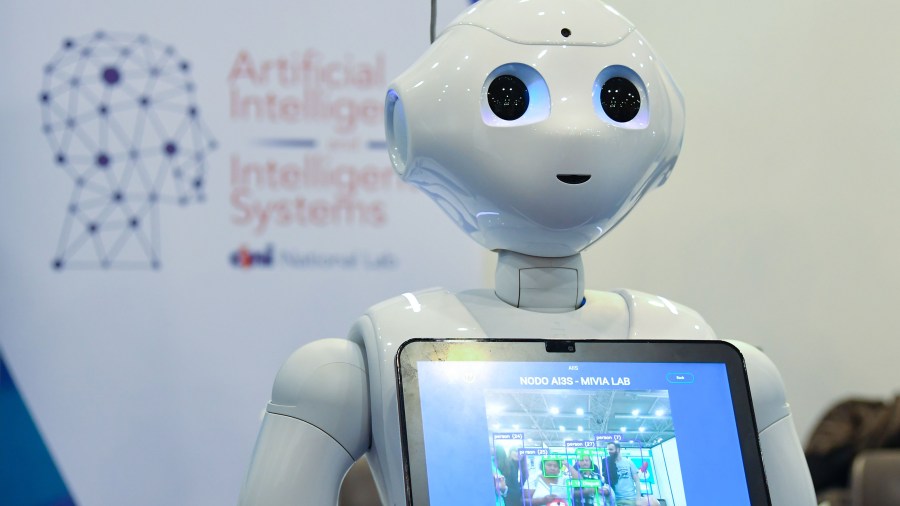Don’t worry about robots taking your job — worry about AI

Automation has been reshaping the job market for hundreds of years. Most of the time, when we talk about the coming wave of automation and how it will change work, we mean robots literally taking jobs in factories or self-driving trucks putting drivers out of business.
But one new study from the Brookings Institution says artificial intelligence will come for all kinds of high paying, white-collar jobs. A Stanford Ph.D. student, Michael Webb, came up with a way to look at the language in AI patents and compare those descriptions with current job openings that require determining risk or analyzing data or detecting cancer.
Using Webb’s data, the Brookings Institution estimates that the higher you’re paid, the more your job may be at risk. Mark Muro is co-author of the Brookings report, and I spoke with him about the study. The following is an edited transcript of our conversation.
Mark Muro: The particular skills here dovetail with particular skills of the white-collar world — they’re often about assessing a lot of information and developing takeaways, identifying patterns, interpreting things, making predictions. Those are some of the strengths of AI and machine learning. They’re also central to what’s going on in offices and businesses.
Molly Wood: What do you think this starts to look like? Is it person and AI job sharing — AI does some parts of a job?
Muro: We see three possible relationships. One is a complementary relationship in which AI allows workers to offload more routine parts of the job, and therefore they are providing different aspects of work, much more judgment, maybe more interpersonal work. It could be a negative relationship in which AI takes over all or most of the tasks within a job. And then you can imagine entirely new work. Think of the ghost workers who are preparing AI training dataset. That’s something entirely new that wouldn’t exist absent AI.
Wood: It does sound like you’re saying that for as much as we’ve predicted a wave of automation that will displace a lot of workers, say, in rural areas or manufacturing, that you’re saying there will still be impacts in places where jobs are concentrated in cities, too, right?
Muro: This is a different picture from factory automation. Robots and factories have been a huge impact on small- and medium-sized companies and certainly small- and medium-sized metropolitan areas and rural places. The parts of the AI economy we’re talking about is a bigger-city phenomena. It’s going to sweep through larger firms and larger cities and change work in our downtown professional, white-collar world. That’s what I find extremely interesting and really quite different from the automation and robotics story.
Wood: What do you think is the timeline for some of this technology and the impacts that you’re predicting?
Muro: Some is now, and some is maybe 30 years from now. Our horizon is the next 30 years, which is the life of implementation of patenting —patenting is our basis of identifying these technologies and activities. Much of this is happening now. If you think about some of the ways that radiology is being completely rearranged with much more use of automatic scan reading, but then whole new roles for radiologists and technicians doing more of that interpretation, more consulting with other medical personnel and nurses and so on. The same significant changes in the legal profession are already underway. I think much is happening now, but we’re talking about a 30-year horizon.
Wood: If you were sending your kid off to college soon, knowing that they’re going to enter into this particular changing workforce, what would you tell them to study?
Muro: I think ultimately, you would want some degree of literacy with tech and math principles, but by and large, it may be that the kind of liberal arts, human skills, come back — the ability to work in groups, interpersonal exchange, the ability to make ethical judgments, all of those things come back. It may be we need to get better at honing those skills, but some of them are hidden in a basic liberal arts degrees. I think broad human-oriented knowledge is going to be increasingly important in this context.
Related links: More insight from Molly Wood
A good analysis of all the research can be found over at Vox. One thing to note that Muro also told me is that although lots of jobs are in danger, apparently CEOs will be just fine.
Other than that, I find some hope in Muro saying that maybe we’ll have to return to honing our more human skills. It’s nice to think we are still capable of a higher function than the machines.
Brookings also published a piece late last week noting that automation could make some jobs even better. But that’s about it for the hopeful point of view.
Bank of America Merrill Lynch recently put out its own report saying almost 800 million jobs — basically half of all the jobs on Earth — could be lost to automation or AI by 2035. Better get cracking on the humanities, kids.
The future of this podcast starts with you.
Every day, the “Marketplace Tech” team demystifies the digital economy with stories that explore more than just Big Tech. We’re committed to covering topics that matter to you and the world around us, diving deep into how technology intersects with climate change, inequity, and disinformation.
As part of a nonprofit newsroom, we’re counting on listeners like you to keep this public service paywall-free and available to all.
Support “Marketplace Tech” in any amount today and become a partner in our mission.














